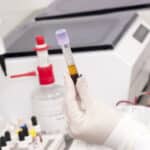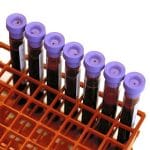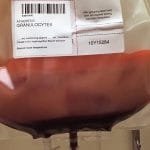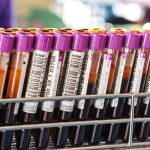Are we ignoring the most important coag factor when transfusing bleeding patients? Melissa Cushing asks, “What about fibrinogen?”
NOTE: Continuing Education credit for this episode has expired. See below for details.

Dr. Melissa Cushing
We Need a Plan!
Dr. Melissa Cushing has studied this issue extensively, and she describes the current evidence for early fibrinogen replacement in the bleeding patient, logistical challenges transfusion services face, studies providing insights to desired fibrinogen target levels, and future options to provide early fibrinogen replacement with increased efficiency and safety.

Dr. Melissa Cushing
We Need a Plan!
Dr. Melissa Cushing has studied this issue extensively, and she describes the current evidence for early fibrinogen replacement in the bleeding patient, logistical challenges transfusion services face, studies providing insights to desired fibrinogen target levels, and future options to provide early fibrinogen replacement with increased efficiency and safety.
About My Guest:
Dr. Melissa Cushing attended Duke University, Georgetown University School of Medicine, Emory University School of Medicine for Clinical Pathology Residency Training, and John Hopkins School of Medicine for her Transfusion Medicine Fellowship. She is a Professor of Pathology and Laboratory Medicine and a Professor of Anesthesiology at Weill Cornell Medical College in New York City. She is the Associate Director of the Clinical Laboratories and the Director of Transfusion Medicine and Cellular Therapy at New York-Presbyterian Hospital, Weill Cornell Campus.
Dr. Cushing has over ten years of experience in Transfusion Medicine and Cellular Therapy and over 75 original research articles, editorials, book chapters, and reviews. Her areas of expertise include the treatment of perioperative bleeding, patient blood management, and innovation in transfusion medicine. At Cornell, she enjoys teaching medical students, residents, fellows and faculty from a variety of disciplines. Melissa lectures at national and international meetings on the targeted treatment of bleeding and patient blood management.
Continuing Education Expired
This podcast episode offered continuing education credit for two years from its release date, but is no longer eligible for such credit.
To find Blood Bank Guy Essentials Podcast episodes with active continuing education opportunities, Click here or visit Transfusion News Continuing Education on Wiley Health Learning.
DISCLAIMER: The opinions expressed on this episode are those of my guest and I alone, and do not reflect those of the organizations with which either of us is affiliated. Dr. Cushing discloses consultant fees from Octapharma and Cerus, and research funding from Cerus. Dr. Chaffin has no relevant financial disclosures.
Further Reading:
- “Rapid review” of fibrinogen concentrate studies to date: Cushing MM and Haas T. Fibrinogen concentrate for perioperative bleeding: what can we learn from the clinical trials? Transfusion 2019 (early view).
- Discussion of not-yet available pathogen-reduced cryoprecipitate: Cushing MM et al. Efficacy of a new pathogen‐reduced cryoprecipitate stored 5 days after thawing to correct dilutional coagulopathy in vitro. Transfusion 2019;59:1818-1826.
- Study comparing economics of cryoprecipitate vs. fibrinogen concentrate mentioned in interview: Okerberg CK et al. Cryoprecipitate AHF vs. fibrinogen concentrates for fibrinogen replacement in acquired bleeding patients – an economic evaluation. Vox Sanguinis 2016;111(3):292-298.
- Study showing association of injury severity and crystalloid administered with low fibrinogen levels: Rourke C et al. Fibrinogen levels during trauma hemorrhage, response to replacement therapy, and association with patient outcomes. J Thromb Haemost 2012;10:1342-1351.
- FiiRST Trial analyzing early fibrinogen concentrate in trauma: Fibrinogen in the initial resuscitation of severe trauma (FiiRST): a randomized feasibility trial. Brit J Anaesth 2016;117(6):775–82.
- E-FIT-1 Study analyzing early fibrinogen concentrate administration in trauma: Curry N et al. Early fibrinogen concentrate therapy for major haemorrhage in trauma (E-FIT 1): results from a UK multi-centre, randomised, double blind, placebo-controlled pilot trial. Crit Care 2018;22:164.
- CRYOSTAT-1 Study analyzing early cryoprecipitate in trauma: Curry N et al. Early cryoprecipitate for major haemorrhage in trauma: a randomised controlled feasibility trial. Brit J Anaesth 2015:1-8.
Thanks to:
- Dr. Daniela Hermelin, Assistant Editor; Follow Daniela on Twitter for fantastic #blooducation!
- Samantha Chaffin, Design and content consultant
Music Credit
Music for this episode includes “Cuando te invade el temor” and “Reflejo,” both by Mar Virtual via the Free Music Archive. Click the image below for permissions and license details.
![]()















Joe:
Another great episode! Do you or Dr. Cushing have any information about whether resuscitations done with whole blood are associated with less hypofibrinogenemia than MTPs done with blood components?
Bruce Jobe
I’m not aware of any information on that issue, Bruce. There’s a ton of active research on using whole blood in trauma, but I haven’t noticed anyone doing that particular analysis.
-Joe
Hi Joe, thank you for all these podcasts over the years. I am a first year haematology registrar (clinical and pathology dual training). I found myself doing some substantial projects this year largely because of the influence and interest generated from these podcasts. I did an audit on actual practices of CMV seronegative and irradiated blood product selection at our facility, and presenting this at a national conference. And now I am involved in a review of MTP practices at a level 2 trauma center. Keep up the good work!
From Sydney, Australia
Congratulations and thanks for the kind words, Eric!
-Joe
Hi!
I think that one of the things that makes studying the coagulation pathways is that all of the factors must be in balance. I suspect too high a factor concentration is as bad a too little. The ratios of the factors to each other must be just right in order for everything to work properly. This might explain the “U” shaped response to fibrinogen replacement as the fibrinogen concentration increased relative to the other Factors.
An example of coagulation working properly when the absolute concentrations are low might be rebalanced hemostasis. You get clot formation even though the absolute concentration of the coagulation factors is decreased because the ratios are correct…
Thanks again for a great interview!!
K